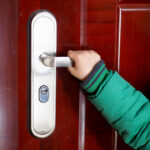Apartment living is great for those who don’t look forward to outdoor chores, such as landscaping and cutting the grass. A smaller living space is significantly easier to keep clean compared to an entire house, but if you don’t organize accordingly, your stuff will clutter up quick. Fortunately, decluttering an apartment is undoubtedly easier than a whole house!
Start Small
Looking at your apartment and figuring out where to start may seem overwhelming, but it will all get organized when you section it off room by room. Find a method that works for you, otherwise start and finish one room at a time, beginning with the largest.
Not only will this keep you on track, but the gratification after organizing a room will be instant. Furthermore, starting with the largest room will get the hardest part out of the way while you’re motivated to declutter, making it a downhill-ride the rest of the way through your apartment.
When in Doubt, Toss it Out
Most of the clutter in your apartment is either trash or junk that should have been thrown out long ago. Sentimental items can be difficult to give up, but you have to be honest with yourself. If an item is troubling you, start with these three questions.
One, does it bring you joy? Two, does it get used regularly? Third, and most importantly, do you need it?
If you answered “no,” to any one of these questions, you’re going to have part ways with it! Any items that still function, such as clothes, appliances, or games, should be placed in a bin or box and can be donated or sold for cash.
Then, grab the trash can and collect all of your broken belongings that need to be thrown away. While it’s recommended to work room to room, picking up all the trash and broken belongings in one sweep will be significantly easier than collecting trash and organizing each room one at a time.
Since you have the trash can in your hand, you might as well pickup any garbage lying around your apartment so you can trash it all at once. This will instantly open up your apartment and make it easier to see where you need to organize.
Hopefully, you will find the majority of your clutter was just trash and broken belongings. If you still have a ton of junk taking up space, keep on reading.
Use a Computer to House Your Paperwork
Computers and printers can eliminate the majority of the paperwork piling up on your counter and table. Scan and store as much paperwork as you can on your computer, flash drive, or external hard drive. After the paperwork has been scanned and stored electronically, it should be shredded and recycled, saving your filing cabinet for only your most recent taxes, bills, and other paperwork.
Multi-Purpose Technology
Figure out ways to eliminate any unnecessary technology. Why have an eighty inch TV on your wall when you can mount a projector from the ceiling?
Who needs a DVD player anymore when everything you want to watch is on Netflix, Hulu, or Disney+? Amazon’s Alexa or Google’s Home can control the entire entertainment center with one remote instead of separate remotes for the TV, the sound system, and DVD player.
Furniture Providing Storage
The best way to save space and money is to purchase furniture that provides storage. A table with drawers will do more for you than a flat top table. Look for chairs and sofas where the arm rests open up and can house the things like remotes and controllers.
Likewise, furniture that can be stored easily will serve you better than large, awkward furniture that’s hard to maneuver around no matter how comfortable it is. Try to make use of furniture that can be stacked and packed away when not in use or even bar stools that fit underneath your counter.
Any way to create space in your apartment is a win.
Multi-Use Furniture
If you can’t find furniture with storage, buy multi-use furniture. Multi-use furniture will give you more options for your apartment’s interior design while also creating space.
If you live in a studio apartment, consider lofting your bed and placing your desk underneath it. If you share a room with someone, you can bunk your beds or a trundle bed to open up the room during the day when you aren’t sleeping.
When it Comes to Visuals, Less is More
Keep a minimalist attitude when it comes to decorations. Avoid lining your apartment shelves and counters with little objects, as guests will see it as clutter and not decorations. Stick to your design and color scheme, any patterns and textures that clash with it in your apartment will only be seen as out of place and unnecessary.
Keep away from dark colors, as they will suck any space out of the apartment like a blackhole. Pick lighter colors for your color scheme to stretch light as far as possible and make your apartment appear larger than it is. As far as decorations are concerned, a few, large decorations will look much better than many, small decorations.
Regulate, Arrange, Repeat
If you want to prevent clutter from piling up, the best thing you can do is “regulate, arrange, and repeat.” After you regulate what you have, whether that means selling, donating, or trashing, you have to arrange your apartment.
This can be difficult, as you may have more items left over than you were expecting. Look at your apartment and think of innovative ways to arrange your belongings and you shouldn’t have to repeat the process as quickly.
Don’t Forget to Look Up
The most overlooked part of an apartment is its vertical space. Tenants have a tendency to look around for space when they could just be looking up. It’s really easy to make floating shelves to add storage space all the way up to the ceiling.
Instead of piling your pots on top of each other, hang them from the ceiling with a rack. This will keep your cupboards open for dishes, slow cookers, and other kitchen supplies.
Develop a Cleaning Habit
It’s hard to create healthy habits, that’s why you can use a spread sheet to help you focus on what room of the apartment needs to be cleaned during which day of the week. Developing the habit of routine cleaning and decluttering is difficult at first, but over time, the regular cleaning and decluttering will lighten the workload and soon it will be second nature.
If the spreadsheet doesn’t work for you, you can download an app to remind you when you need to clean certain areas of your apartment and what needs to be organized. A simple, healthy habit to get into is cleaning out your closet at least twice per year. This will lead to more healthy cleaning and organizing habits.
Unworn Clothes Should be Sold or Donated
More often than not, people have a tendency to purchase clothes until they run out of space. If you find yourself in this dilemma, turn all of your hangers one way at the beginning of fall and spring. At the end of the season, all the clothes still facing the same way as the beginning of the season went unworn, and you should remove them from your wardrobe.
With today’s technology, it is extremely easy to get money for any unworn clothing or footwear. Any clothes, shoes, or boots that you want to get rid of can be uploaded to your Facebook or Instagram, and you’re more than likely able to find a friend that will want to purchase them.
If you’re comfortable selling to strangers, you can post the clothes to Facebook Marketplace or Depop, which is essentially the same thing Instagram but for buying and selling used clothes. If you can’t find any interested buyers, you donate them to the local thrift store.
End Impulse Buying
A large city offers amazing store fronts with tons of window shopping, but the downfall is impulse purchases can strike even the most devote budgeters that much easier. Before you go out shopping, take inventory of what you have.
Like grocery shopping, make a list of what you clothing items need and take note of how much money you can afford to spend. When you feel an impulse hit, you can look back at your list and determine if what you’re looking at is a want or a need. If it’s a need and within budget, you can get it. If it’s a want, ask yourself if you can honestly afford to drop the cash on it and if you will wear it more than once.
If it’s within your budget and you know you will wear it more than once, you will have to decide what piece of clothing in your closet or dresser is going to be sold or donated so you can make room for the one you’re looking at.
Otherwise, if you it’s beyond your budget or you will only wear it once, then you have to refrain! No one likes being told “no,” but if you can resist the impulse-buys you can save money while also saving space.









